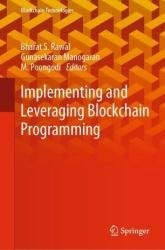Implementing and Leveraging Blockchain Programming
- Добавил: literator
- Дата: 15-01-2022, 17:39
- Комментариев: 0
 Название: Implementing and Leveraging Blockchain Programming
Название: Implementing and Leveraging Blockchain ProgrammingАвтор: Bharat S. Rawal, Gunasekaran Manogaran
Издательство: Springer
Серия: Blockchain Technologies
Год: 2022
Страниц: 217
Язык: английский
Формат: pdf (true), epub
Размер: 32.8 MB
This book gives a comprehensive overview of blockchain programming and its implementation in the wide range of blockchain-based applications such as cross-border payment, digital banking, and digital identities. The consistent thrive of the blockchain phenomenon and the ecosystem of e-business use cases have led to the Industrial Revolution in the e-business world, and it is demonstrated in this book. The digital advancement, interference, and transformation being brought through the influence of the blockchain advancements are creating waves across e-business verticals. The book caters to academics, industrial practitioners, and entrepreneurs working in the field of blockchain technology and programming.
Since ancient times, there has been a need to protect information considered confidential or secret, with the aim of keeping it out of the reach of a possible enemy or adversary. This has been done in various ways: by preventing physical access to it, by disguising its nature, or by using cryptographic procedures to transform it to prevent access to its content. The aim of cryptography is not to hide the existence of a message, but rather to hide its meaning, a process known as encryption.
Against the use of cryptographic procedures and methods, the opposite side will use cryptanalysis procedures. Cryptanalysis consists of compromising the security of a cryptosystem. This can be done by decrypting a message without knowing the key, or by obtaining from one or more cryptograms the key that has been used in its encryption.
The discovery of a secret encryption algorithm is not considered cryptanalysis; instead, we must assume that algorithms are always known. In general, cryptanalysis is usually carried out by studying large numbers of message-cryptogram pairs generated with the same key. The mechanism used to obtain them is indifferent and can be the result of listening to a communications channel, or the possibility that the object of our attack responds with a cryptogram when a message is sent to it. Obviously, the greater the number of pairs, the more likely the cryptanalysis will be successful. The adjective classical, as opposed to modern, is due both to the techniques used, basically character substitution and transposition operations, with or without a key but always linked to the concept of a secret key, and to the use of symmetric cryptography in machines dedicated to encryption.
Contents:
Introduction to Cryptography in Blockchain
Quantum-Safe Cryptography and Security
How Profitable Is Bitcoin Mining?
Generative Adversarial Network-Based Visual-Aware Interactive Fashion Design Framework
Plasma Chain and Blockchain Security Model
Blockchain, Smart Contracts, and Decentralized Applications: An Introduction
A Contingent of Blockchain-IoT - An Organized Review
A Secured Data Processing Model for Monitoring the Student’s Performance Using Decentralized Application
An Efficient Trust-Based Supply Chain Management Framework Utilizing the Internet of Things and Blockchain Technology
Blockchain Technology and Machine Learning for Fake News Detection
Using Blockchain-Based Attestation Architecture for Securing IoT
The Forgotten Cryptocurrencies: Beyond Bitcoin
Decentralized Application for the Classification of Products Based on IPFS and Blockchain
Скачать Implementing and Leveraging Blockchain Programming
Внимание
Уважаемый посетитель, Вы зашли на сайт как незарегистрированный пользователь.
Мы рекомендуем Вам зарегистрироваться либо войти на сайт под своим именем.
Уважаемый посетитель, Вы зашли на сайт как незарегистрированный пользователь.
Мы рекомендуем Вам зарегистрироваться либо войти на сайт под своим именем.
Информация
Посетители, находящиеся в группе Гости, не могут оставлять комментарии к данной публикации.
Посетители, находящиеся в группе Гости, не могут оставлять комментарии к данной публикации.
